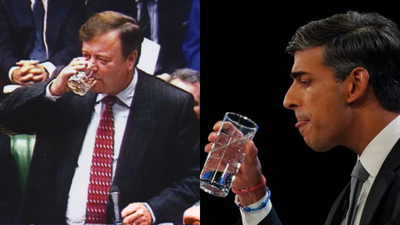For centuries, Britain’s Chancellors of the Exchequer have delivered their annual budget statements fortified by a cherished tradition—a budget-day drink. This one day of the year allows them to indulge at the Despatch Box, adding a spirited twist to the otherwise solemn economic forecast.
Yet, since the mid-1990s, Chancellors have progressively traded booze for water, coinciding with a somewhat ironic turn in the UK’s economic fortune. This “switch to sobriety,” some wags suggest, might have diluted the country’s fiscal firepower.
Over the years, the custom has evolved into a quirky barometer of the nation’s economic outlook, where the Chancellor’s chosen beverage appears, humorously, to correlate with economic health. Of course, one shouldn’t walk into a post-hoc ergo propter-hoc trap but it’s still fascinating to see a coincidental coorelation between a Chancellor‘s drink and the British economy’s health.
Raise a Glass, Raise the Economy
On budget day, the usual parliamentary ban on alcohol is lifted solely for the Chancellor. This tradition dates back centuries, blending Britain’s fondness for ritual with a dash of whimsy. A look at some of the most famous budget-day drinkers reveals a curious correlation between their tipple and the nation’s prosperity:
• Benjamin Disraeli: Brandy and water
• William Gladstone: Sherry with a beaten egg
• Winston Churchill: Brandy
• Hugh Dalton: Rum and milk
• Hugh Gaitskell: Rum and orange
• Geoffrey Howe: Gin and tonic
• Nigel Lawson: Spritzer
• Kenneth Clarke: Whisky
Kenneth Clarke’s 1996 whisky-sipping speech was, to date, the last instance of a Chancellor indulging in anything stronger than water. Clarke’s whisky budget was bold and confident, a farewell to the days when budgets were laced with a bit of liquid courage. As whisky gave way to water, some claimed the country’s economic fate lost its edge.
The Switch to Water and Economic Woes
Starting in 1997, Gordon Brown opted for water, marking a shift toward a “sober” fiscal era that’s continued with every Chancellor since. From Philip Hammond to Alistair Darling, the Despatch Box has been hydrated, but without a hint of the more spirited elixirs of yore. A few of these water-only budgets coincided with moments of particular economic strain, hinting, albeit humorously, at a lack of fiscal bravado that some blame on the absence of a boozy boost.
Take Darling’s 2008 “Standard Water,” which he sipped in a nod to the London Evening Standard’s tap-water campaign. The gesture was noble but coincided with the 2008 financial crisis, beginning what would become a particularly parched era for the UK economy.
While any actual connection between a Chancellor’s drink and the UK’s fiscal health is purely coincidental, it’s hard to ignore the intriguing correlation. Much like the tongue-in-cheek claim that the decline in pirates correlates with global warming, the UK’s switch from booze to water on budget day aligns, amusingly, with certain economic indicators.
A whimsical look at UK budget traditions suggests that Chancellors with whisky and other spirited drinks led periods of economic prosperity, while water-wielding successors faced greater struggles: Kenneth Clarke’s whisky-fuelled budget in 1996 coincided with high GDP growth (3.7%) and low inflation (2.4%), marking a peak before water-only years began. Gordon Brown, favouring water from 1997 to 2007, saw steady growth but faced global crises like the 2008 recession, which critics blamed on a lack of budgetary boldness. Alistair Darling’s “Standard Water” in 2007–2010 oversaw Britain’s deepest post-war recession with GDP plummeting by 4.3% in 2009 and inflation spiking to 5.2%. George Osborne’s water-fuelled tenure (2010–2016) introduced austerity, yielding tepid growth and high unemployment (peaking at 8.5%), while Rachel Reeves’s 2024 water-only budget, yet to play out, has some wondering if a tipple might again foster a braver economic outlook.
From whisky to water, Britain’s economic temperament has moved from daring to disciplined. Perhaps, one day, a future Chancellor will raise a glass at the Despatch Box once more, symbolically bringing back a bit of the audacious spirit that seemed to define the nation’s prosperous past. Of course one shouldn’t give into a post-hoc ergo propter hoc fallacy but still, it’s fascinating to see that since the Chancellors switched to water, the British economy has been tepid.
